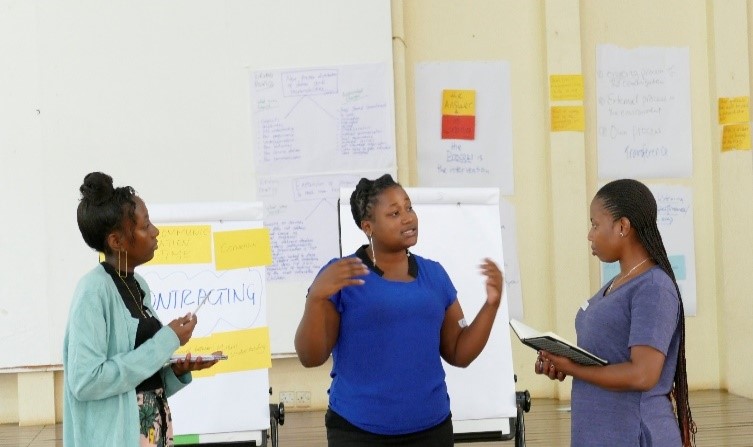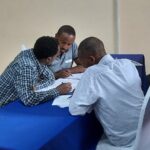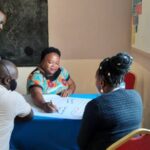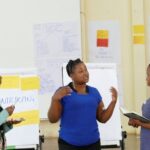FOLD cycle E-1 (April-August 2022), started with module 1 in April 4 -9 2022, in Moshi, Tanzania. Seven (7) CSO leaders from attended the training. The structure and content of module one enabled participants to engage with their organizations as the context for learning, in this very practical and hands on training in OD and transformational leadership skills.
The training processes enabled participants to learn new skills, tools and techniques, as well as strengthen values that are key for transformative leadership styles facilitation of learning and change. The training itself utilized processes that enabled participants to engage their experiences in the learning activities, which generated their active participation and enabled them to identify with the content of the training. Strategic questioning techniques and alternative language channels like metaphors, roleplays and story telling were applied in ways that supported participants to critically self-reflect to make meaning and generate new insights from experience.
Facilitating change: a process accompanied with tools and special skills
FOLD cycle E-1 (April-August 2022), started with module 1 in April 4 -9 2022, in Moshi, Tanzania. Seven (7) CSO leaders from attended the training. The structure and content of module one enabled participants to engage with their organizations as the context for learning, in this very practical and hands on training in OD and transformational leadership skills.
The training processes enabled participants to learn new skills, tools and techniques, as well as strengthen values that are key for transformative leadership styles facilitation of learning and change. The training itself utilized processes that enabled participants to engage their experiences in the learning activities, which generated their active participation and enabled them to identify with the content of the training. Strategic questioning techniques and alternative language channels like metaphors, roleplays and story telling were applied in ways that supported participants to critically self-reflect to make meaning and generate new insights from experience.
Facilitating change: a process accompanied with tools and special skills
Feedback through reviews of each day’s learning, as well as end of week evaluation showed that participants had internalized the knowledge, tools and specific skills that are essential for a change facilitator’s intertventions or a leader’s styles to become transformative for individuals, teams, organizations or communities. For instance, participants discovered that facilitating change is a process that involves stages, and each stage counts, e.g., how a facilitator goes about contracting with clients, has a pivotal influence on the success of next stages of an OD intervention. In addition they showed how they had mastered tools and techniques that support people to surface orgaizational issues, and take ownership and responsibility for their own learning and change processes.
In terms of emerging leadership knowledge acquired, participants expressed new awareness that a transformational leader does not impose own knowledge, ideas, or needs in the issues of others, but supports them to learn from their own experience, using skills and tools that enable them to see their own development questions or needs.
When facilitating you don’t impose what you have. You have to give people a space to share. If you get stuck on what you want to say, you will limit them from being part of the process.”
Abela Makandala
FOLD participant, on last day of module 1In terms of emerging leadership knowledge acquired, participants expressed new awareness that a transformational leader does not impose own knowledge, ideas, or needs in the issues of others, but supports them to learn from their own experience, using skills and tools that enable them to see their own development questions or needs.




